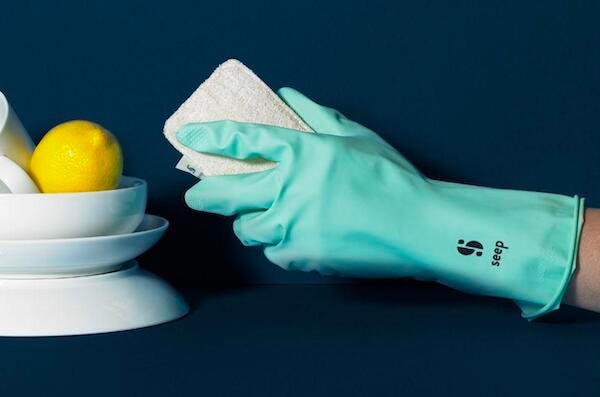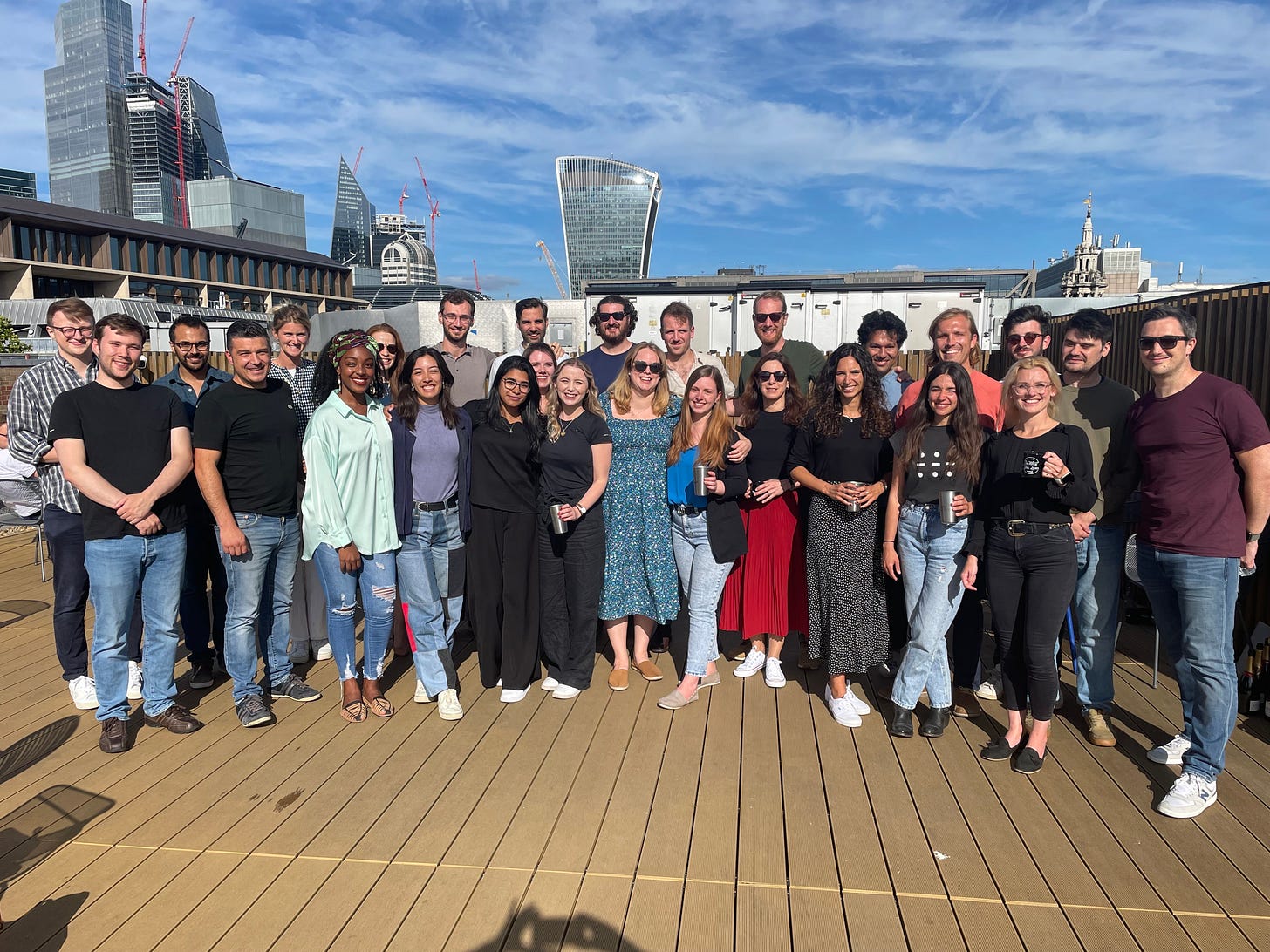🌱 Closing the loop: 4 partners to refurbish your company technology, and how Seep are cleaning up the way we clean up.
Featuring Seep, The Boatyard Distillery, Candy Kittens and more...
Happy Monday!
This week we cover:
Quick Take: Why refurbished tech is charging up the agenda.
Brand Spotlight: Seep are cleaning up the way we clean up, here’s how.
In case you missed it: 🤝#4 - Meet the Partners: Altruistiq
Working at the intersection of consumer goods and sustainability? We’d love to meet you! Let’s toast the steps we’ve taken throughout 2022 at Raye the Store, in support of City Harvest London.
Your ticket price is up to you, and 100% of sales will be donated.
> Good News Last Week
🎯 The Boatyard Distillery launched their new Eco Refill Pouches, a step on their journey to becoming carbon neutral.
🎯 Just Eat for Business announced it was expanding their partnership with CLUBZERØ. The expansion will see over 15 restaurants and cafes in London and surrounding areas provide the service with reusable takeaway cups and containers to London businesses.
🎯 Dizzie, formerly Good Club, has launched a B2B “packaging as a service” - offering to brands and retailers, ahead of their crowdfund.
⭐️ Coop is taking money they would’ve spent on a Christmas ad campaign, and supporting Your Local Pantry instead. The membership-based food scheme and community hub allows individuals to pick up food at a discount. The partnership aims to support over 32,000 households over the next 3 years, saving them £5 million on shopping bills.
⭐️ Danone announced its Re Fuel programme, pledging 100% renewable electricity for energy used in operations by 2030 (up from 68.5% at present). They also pledge to improve energy efficiency by 30% by 2025, alongside pledges to shift to local energy sources wherever possible - supporting local economies in the process.
⭐️ Coop has committed to removing all coloured milk bottle caps from its shelves to increase recyclability. This comes after successful consumer trials on semi-skimmed milk in more than 400 Co-op stores in August. Green caps will be switched at the end of the month, and then red and blue in early 2023.
⭐️ Premier Foods announced it’s working with FareShare to provide the equivalent of 100,000 meals to help feed people across the UK. This will involve them donating 30 pallets worth of food, and running a ‘Win a dinner, Give a dinner’ on pack competition from January 1st to the 30th of September across Oxo, Bisto, Paxo, Lloyd Grossman and Sharwood lines.
⚡️ 1.5°C Supply Chain Leaders in the Exponential Roadmap Initiative have called on corporates to halve value chain emissions by 2030, by issuing a declaration at COP27 calling for other corporations to join the initiative. Businesses already involved include BT, Unilever and Ikea, and today the initiative represents $440bn in annual revenue.
⚡️ B Corp Uk announced they’ve reached 1000 certified B Corps in the UK.
> Click on each link to read more.
> Quick Take
Why refurbished tech is charging up the agenda.
With estimates that e-waste (electronic waste) is the world’s largest growing waste stream, the refurbished electronics sector is pushing for businesses to include using refurbished electronics to their sustainability strategies. There is increasing awareness that a stronger circular economy is needed and without action, the UK is predicted to be the largest producer of e-waste per capita by 2024.
The carbon footprint of electronic gadgets and the internet makes up 2-5% of greenhouse gas emissions globally. Most of the hidden emissions of electronic waste are within the manufacturing chain, with around 55kg CO2 emitted in the manufacture of one spare phone. There's also a huge opportunity to keep precious materials and metals (which are becoming increasingly conflict triggering, expensive and rare) in the loop - for every 1 million mobile phones recycled, 35,000 tonnes of copper can be recovered.
The green transition in the electronics sector needs to happen at scale, led by a change in perceptions and an increase in awareness. What can your brand do? Set targets to cut your own e-waste, and make sure you’re either repairing goods before disposing of them, or recycling any goods that can no longer be repaired. Lucky for you, we’ve highlighted four companies that your brand can work with to make this transition to refurbished tech:
Klyk - Phones, laptops and more.
Klyk estimates a 60% cost saving by transitioning to refurbished technology. The B Corp works with businesses to deliver refurbished tech and has saved over 1,500kg of E-waste and 157 tonnes of CO2 so far. Exclusively working with businesses, Klyk has worked with brands including Candy Kittens to deliver refurbished hardware and technology.
Reboxed - Phones.
Their Rehome Your Phone platform makes it easy to trade in old devices, returning economic benefits and ecological benefits by keeping parts in circulation and reducing the need for manufacture of new phones. With the belief that ‘great tech shouldn’t cost the earth’, Reboxed’s circular business model follows the mantra “rehome, rebox, repeat” and they ensure the proper recycling of any tech that cannot be re-homed.
Back Market - Phones, laptops, watches and more.
Having developed a network of ‘Refurbishers’, BackMarket has a series of rigorous processes to ensure the consistent quality of their refurbished phones. “Rebels with a cause” BackMarket aims to challenge the way tech is viewed too. Tech is graded on appearance and durability to ensure that there’s transparency around the quality of the products they sell, and all come with a 12-month warranty.
Nxt2Nu - Phones
With the aim to revolutionise the second-life technology industry, Nxt2Nu value their support and industry experience to deliver a circular economy for businesses. With a quality guarantee of pristine condition, revolutionising the technology sector is at the top of their agenda.
With initiatives like Hubbub’s Time After Time E-Waste Fund, in partnership with Virgin Media O2 to deliver grants for pioneering e-waste initiatives, the issue of electronic waste is being pushed higher up the agenda. However, more focus from businesses, and a greater understanding of the need to take responsibility for their own e-waste along their journey of becoming more planet positive, is still needed.
> Brand Spotlight
Seep are cleaning up the way we clean up - here’s how:
Every single day, brands, companies and individuals join the fight against unnecessary plastic products - particularly those single-use, virgin plastics that sadly we see everywhere. This step change is huge, let’s not take away from that. We’ve seen progress from companies like Notpla who have created packaging from seaweed, Kellogg’s who have replaced plastic cereal liners with paper versions, and Allbirds who have created a 100% plant-based leather trainer rather than use traditional plastic materials. The fight on our collective overuse of plastic is a perfect example of how cumulative action can make a huge difference, and in a relatively short time. Amongst all the positive change, there are sources of plastic that improvements have been historically focused on less. A perfect example, and taking the brand spotlight this week, is Seep.
Seep are out to tackle the ‘most unsexy of the unsexy’ - household cleaning products.
Seep - Sustainable Everyday Essential Products - was built on the fact that every single day almost 1.5 million kitchen sponges are disposed of (that’s over 1000 per minute), of which almost all are virgin plastic. Whilst the world has already started tackling the cleaning liquids and solutions via brands like smol and method, what we lacked was easily accessible, readily available and non-polluting cleaning tools to administer them with. That is why Seep exists.
Since their launch in June 2020, Seep’s product range now covers everything from bin liners to scourers, sponges to tea towels. All of Seep’s products are 100% plant based, they’ve received grant money from ReLondon for product design (as part of London’s Green Deal Fund) and are also a member of the Ellen MacArthur Foundation too. Not stopping there, they’re prioritising using renewable energy and non-virgin materials, are toxin and micro-plastic free and a dream to look at too. All this before they naturally ‘seep’ back into the earth, as many products are 100% compostable too.
Seep have also worked with charity On A Mission to calculate their emissions, which total 40 tonnes of CO2e every year. Whilst their mitigating their impact in any way they can, they’re also offsetting 3.5x their emissions through On A Mission too - focusing on mangrove forest restoration with 8,075 plants planted so far!
As well as being gentle on the planet, Seep is also gentle on people too. With a workforce of over 80% women, donation schemes with companies including Camp Kernow, option schemes, two days of volunteering a year and an end goal of a truly transparent supply chain, Seep’s mission balances people, planet and profit. They even donated 50% of their sales profits to The Felix Project on Christmas Eve 2021. So, it comes as no surprise that in their first B Corp assessment, Seep scored a whopping 110.7 - placing them in the top 5% of all B Corps and in the category for ‘Best in the World’ for the environment. All things considered, Seep really are trying to make the world a cleaner place.
Support Seep via their shop:

> In case you missed it
🤝#4 - Meet the Partners: Altruistiq
MEASURE DATABASE - Featuring Saif Hameed, CEO and Founder.
> Follow up with…
Blog: Seep’s Green Tips
Podcast: What are microplastics?
Event: Bread & Jam Christmas Party - Tuesday 22nd November




